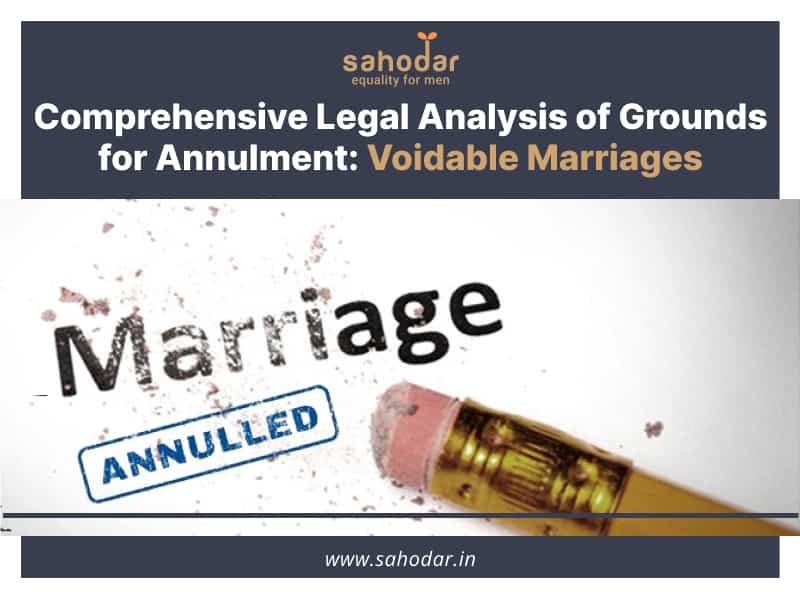Introduction:
The legal landscape surrounding voidable marriages entails a complex interplay of statutory frameworks, judicial precedents, and evolving societal norms. This comprehensive analysis delves into the legal intricacies governing specific grounds for annulment, providing a thorough examination of the foundational principles underpinning voidable marriages.
Lack of Capacity: A Jurisprudential Imperative
In matrimonial law, cognitive capacity forms the bedrock of marital consent. Lack of mental capacity, whether due to severe mental illness or intoxication, poses a substantial ground for voidability. Jurisdictions universally acknowledge that parties entering into a marriage must possess the mental acuity to comprehend the nature and consequences of the marital contract. The legal system further distinguishes between temporary incapacitation, such as intoxication at the time of marriage, and enduring mental incapacity, both of which may serve as grounds for annulment.
Non-Consummation: Legal Recognition of Physical Union
Voidability arising from non-consummation hinges upon the legal acknowledgment of the physical aspect of marriage. Legal jurisdictions differ in their treatment of non-consummation as a ground for annulment. In jurisdictions recognizing non-consummation, the failure to engage in sexual intercourse, if deemed significant to the marriage or undisclosed before the union, may render the marriage voidable. The legal system acknowledges that parties entering into matrimony implicitly consent to the conjugal act as a fundamental aspect of the marital commitment.
Fraud or Misrepresentation: Legal Implications of Deceptive Practices
The annulment of marriages founded on fraudulent inducements or material misrepresentations speaks to the broader legal principle of transparency within the marital contract. Instances of fraud may encompass misrepresentations regarding identity, financial standing, or undisclosed prior marriages. Legal recourse for annulment based on fraud is contingent upon the substantiation of deceitful practices, emphasizing the legal system’s commitment to upholding the integrity of consensual agreements within the institution of marriage.
Duress or Coercion: A Legal Invalidation of Compelled Consent
Voidability on grounds of duress or coercion underscores the legal recognition of the inviolability of voluntary consent within marital unions. Parties coerced into marriage against their will may seek annulment on this ground. Duress may manifest in various forms, ranging from physical threats to emotional manipulation. The legal system’s acknowledgment of this ground aligns with the fundamental principle that marriages must be entered into freely and voluntarily, devoid of external pressures.
Impotence: Legal Nuances in Determining Physiological Constraints
The recognition of impotence as grounds for annulment is subject to specific legal criteria that vary across jurisdictions. Impotence, understood as the inability to engage in sexual intercourse, demands precision in legal delineation and substantiation. Courts typically require thorough medical examinations to establish the physiological constraints inhibiting the physical consummation of the marriage. The legal landscape on this matter is nuanced, with jurisdictions adopting diverse approaches to the definition and assessment of impotence.
Underage Marriage: Statutory Parameters of Marital Consent
Legal frameworks universally prescribe a minimum age for marital consent, reflecting societal norms regarding cognitive maturity requisite for entering into a binding marital contract. Marriages involving individuals below the statutorily prescribed age are susceptible to being declared voidable. The legal system mandates that valid marital consent necessitates an age at which individuals can comprehend the complexities of the marital commitment. Annulment on grounds of underage marriage aligns with the legal principle that parties must possess the legal capacity to provide informed and voluntary consent.
Conclusion:
This comprehensive legal analysis illuminates the nuanced framework governing voidable marriages. The identified grounds for annulment — lack of capacity, non-consummation, fraud or misrepresentation, duress or coercion, impotence, and underage marriage — epitomize the legal system’s commitment to upholding the sanctity and integrity of the institution of marriage. For individuals navigating the complexities of voidable marriages, engagement with legal counsel is imperative. Jurisdiction-specific variations, evolving societal norms, and the dynamic nature of legal interpretations underscore the need for a meticulous understanding of the legal landscape surrounding annulment. In essence, the legal discourse on voidable marriages serves as a testament to the legal system’s dedication to maintaining the foundational principles of informed, voluntary consent within the evolving societal construct of matrimony.

